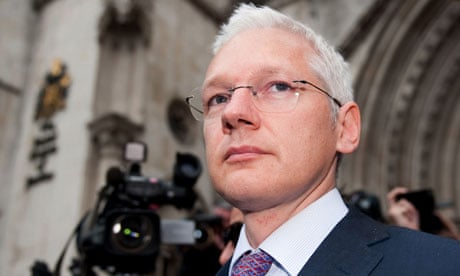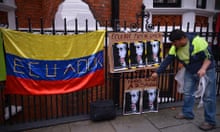In his superb essay The Paranoid Style in American Politics, Richard Hofstadter took care not to tie paranoia to a particular ideology. He was writing after the red scare of McCarthyism had driven thousands of allegedly "subversive" Americans from their jobs. In that cold climate, it felt natural to investigate conservative-led outbreaks of hysteria. Throughout American history, rightwing movements had raged against masonic, Catholics and Jewish conspiracies. In Hofstadter's day, they had led demented campaigns against gun control and fluoride in the water supply. If Hofstadter were alive today, he would doubtless write about the birther movement, or cast a scornful eye at the gibbering career of Glenn Beck, formerly of Fox News, who has all the traditional anxieties about secret societies and Jews.
But although Hoftstadter investigated the manias of conservatives, he refused to call them conservative manias. Rather than use the language of right and left he explained that he preferred to talk of the paranoid style, "simply because no other word adequately evokes the sense of heated exaggeration, suspiciousness, and conspiratorial fantasy that I have in mind."
The right does not have a monopoly on paranoia, as the conspiratorial fantasies of supporters of Julian Assange show. Glenn Greenwald, Glenn Beck's namesake and mirror image on the American left, made it embarrassingly obvious in the Guardian last week that a paranoid "leftist" defence of an alleged rapist was the order of the day. Greenwald argued that Assange was not a coward who dare not face his Swedish accusers but a true dissident, who was camping out in the Ecuadorean embassy because he had a genuine fear of persecution. America "would be able to coerce Sweden into handing him over far more easily than if he were in Britain", he explained.
It was a small country "generally more susceptible to American pressure and bullying". The poor man did not know that Britain has a notoriously lax extradition treaty with the United States, which the liberal-minded have condemned for almost a decade. Nor did he blink at what must be the crankiest request for refugee status ever. Assange is the first asylum seeker to claim persecution at three removes. He wants to renounce his Australian citizenship and become an Ecuadorean because (and you may have to bear with me) the Australian government failed to help him fight an attempt by the British government to extradite to him to Sweden, whose government may, at some undefined point, extradite him to the United States – or maybe not, because there is no extradition request.
More pertinently, Greenwald and the rest of Assange's supporters do not tell us how the Americans could prosecute the incontinent leaker. American democracy is guilty of many crimes and corruptions. But the First Amendment to the US constitution is the finest defence of freedom of speech yet written. The American Civil Liberties Union thinks it would be unconstitutional for a judge to punish Assange.
The authorities can threaten the wretched Bradley Manning and hold him in solitary confinement because he was a serving soldier when he passed information to Assange. But WikiLeaks was in effect a newspaper. From the 1970s, when the New York Times printed the Pentagon Papers, to today's accounts of secret prisons and the bugging of US citizens, the American courts "have made clear that the First Amendment protects independent third parties who publish classified information". Maybe the authorities could prosecute Assange for alleged links with hackers. I don't know – unlike Assange, I cannot see the future. But why would they bother to imprison him when he is making such a good job of discrediting himself?
Reasonable doubt cannot stay the tongues of Ken Loach, Tariq Ali, Jemima Khan, Naomi Wolf, John Pilger and their comrades. They lament western wickedness with the reliability of professional mourners. For them, America is a demonic empire with supernatural power and reach. The constraints that bind ordinary nations cannot contain it. I refuse to call their conspiracy theories "leftwing," and not only because most of the British liberal left behaved honourably during the WikiLeaks affair. Hofstadter's caution needs to be remembered too – paranoia turns everything it touches to dirt. The professed principles of sufferers are no exception. The American right's hatred of immigrants makes a nonsense of its belief in free markets, which require the free movement of labour. Its opposition to gun control makes its claims to be tough on crime equally ridiculous. Mutatis mutandis, the leftwing defenders of Assange are equally willing to destroy their own beliefs.
Conservatives throw around the phrase "leftwing feminist". They do not understand that although most feminists are on the left, it is far from clear that all leftwingers are feminist. If the indulgence of Islamists who believe that divine law mandates the subjugation of women did not convince you on this point, the treatment of Assange's alleged victims ought to make you think again. Some of Assange's supporters say that the women have no right to put allegations of sexual abuse before a competent court. Instead, they denounce them as "feminazis" in language so extreme that the women's lawyer said his clients were "the victims of a crime, but they are looked upon as the perpetrators". I doubt that posterity will recall much that Assange said. But it ought to remember his assertion that "Sweden is the Saudi Arabia of feminism". In one sentence, Assange encapsulated the special pleading and misogyny of a rotten "progressive" culture.
The left also has a taboo against naming names that, coincidentally, dates back to McCarthyism. Yet WikiLeaks' supporters continue to defend Assange after he published the names of dissidents opposed to every vile movement and regime from the Taliban to the Belarusian KGB. Secret police forces and punishment squads across the world now have evidence they can use to imprison and torture.
Activists, who claim they are the enemies of patriarchy, dismiss allegations of sexual abuse as a CIA conspiracy. Comfortable and ignorant men and women, who claim to be on the side of the "resistance" in its struggles against hegemonic power, grass up real resisters against authentic dictatorship. In 1964, Hofstadter noted the tendency for the paranoid to emulate the enemy they claim to oppose. His words read as well today: "It is hard to resist the conclusion that this enemy is on many counts the projection of the self; both the ideal and the unacceptable aspects of the self are attributed to him."







